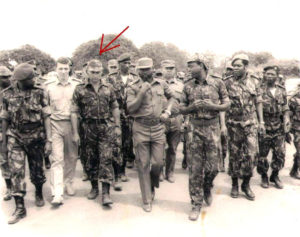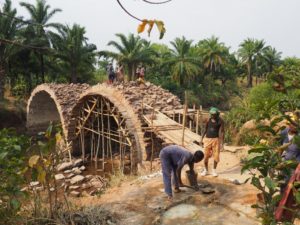by Donovan McGrath
War in Ukraine: Why Vladimir Putin couldn’t have trained fighters in Africa
(BBC online – UK) A black and white image which some people falsely claim shows Russian President Vladimir Putin training liberation movements in southern Africa, has been circulating. Extract continues: It has been used by some to justify why African countries should support Russia in the war in Ukraine… The photograph was widely shared online after it was posted in Zimbabwean blogs at the end of 2018. The posts claimed it shows Mr Putin in a Tanzanian military training camp for southern African independence movements in 1973… “Putin stayed in Tanzania training freedom fighters for four years from 1973 to 1977,” the blogs also claim. However, there is no evidence either from Russian or African records of Mr Putin, who was born in 1952, having been to the continent during the 1970s. Mr Putin’s profile on the Kremlin website show that he was studying at the Leningrad State University at the time, and graduated in 1975. Also outside training offered to Mozambican freedom fighters in camps in Tanzania was largely conducted by Chinese instructors, not Soviet ones… Although the man pictured is thought to be a Soviet official, so far no-one has been able to confirm his actual identity… (15 March 2022)
Tanzania’s Zanzibar Island Helps Ukrainians Stranded by Russia’s Invasion
(VoA news online – USA) Extract: Zanzibar’s President Hussein Mwinyi on Monday said they were helping about 900 Ukrainians who were there on vacation when Russia invaded their country … Authorities said the Ukrainians are not able to safely return home but cannot stay on the Tanzanian island as local media reported they are running out of money. In comments sent to the press, Mwinyi said they have initiated talks with hotel owners on how they can help these people. He said they will help the Ukrainians until their government is ready to come to their assistance… Officials with the Ukrainian Embassy in Kenya said, “Zanzibar is a pretty popular tourism destination for Ukrainian nationals, so it was clear that there would be an issue. We contacted the tour operators who sent the tourists to Zanzibar. We realize that we have about 1,000 people – we got in touch with Zanzibar to see the possible measures and possible ways how the Tanzanian government can cooperate with the Zanzibars to protect our nationals.” … Zanzibar’s tourism ministry says the country received more than 2,300 Ukrainian tourists and more than 18,000 Russian tourists in 2020… Tanzania … [has] ordered its few hundred citizens living in Ukraine to leave the country. (1 March 2022)
International students trapped in Ukraine appeal for urgent evacuation
(Guardian online – UK) Extract: International students trapped in a Ukrainian town near the Russian border have made desperate appeals for evacuation, as the number thought to be stranded in Sumy has risen to between 1,200 and 1,500, and they are running out of basic supplies… [l]t emerged that 500 foreign students were stuck in the city, including almost 400 Nigerians, three Irish students and pupils from Rwanda, Lebanon and Tanzania… (4 March 2022)
Landmine-hunting hero rat dies in Cambodia after stellar career
(Guardian online – UK) Extract: A landmine-hunting rat that was awarded a gold medal for heroism for clearing ordnance from the Cambodian countryside has died. Magawa, a giant African pouched rat originally from Tanzania, helped clear mines from about 225,000 square metres of land – the equivalent of 42 football pitches – over the course of his career… Magawa was the first rat to receive a medal from British veterinary charity PDSA in the 77 years of the awards, joining an illustrious band of brave canines, felines – and even a pigeon… (12 January 2022)
9 million children to be vaccinated against polio in Africa
(Washington Post online – USA) Extract: … The urgent vaccination campaign has started in Malawi where drops of the inoculation are being placed in the mouths of children across the country, including in the capital, Lilongwe, and the country’s largest city, Blantyre. The vaccination campaign will be expanded … to include the neighbouring countries of Mozambique, Tanzania and Zambia, according to UNICEF which is working with the governments and other partners… In Tanzania, UNICEF has trained more than 2,000 health workers, 5,128 social mobilizers and 538 town criers, and facilitated the procurement of 3,000 vaccine carriers and 360 cold boxes, expected to be delivered in April 2022 for use in the upcoming rounds of campaigns… (22 March 2022)
U.S. will ‘surge’ vaccine support to 11 African countries
(Washington Post online – USA) The initiative aims to protect Americans and the world from new coronavirus variants. Extract continues: The Biden administration will “surge” more that $250 million in coronavirus vaccine assistance to 11 countries in sub-Saharan Africa, including several where the omicron variant was first identified, as it ramps up efforts to help vaccinate the world, according to a document obtained by The Washington Post and confirmed by global health officials… According to a Global VAX initiative “field guide” shared with diplomatic contacts, the United States will prioritize countries in sub-Saharan Africa – starting with Angola, Cote d’lvoire, Eswatini, Ghana, Lesotho, Nigeria, Senegal, South Africa, Tanzania, Uganda and Zambia -to “receive intensive support” for their vaccination campaigns through in-person staffing, technical assistance and more diplomatic engagement. Those countries have generally vaccinated fewer than 40 percent of their populations against coronavirus, according to the Our World in Data tracking project at the University of Oxford … (17 February 2022)
A jaw-some find! Scientists discover the fossilised remains of a new species of ‘crocodile-like beast’ that roamed what is now Tanzania 240 million years ago – and had ‘powerful jaws with knife-like teeth’
(Daily Mail online – UK) Extract: … Palaeontologists at the University of Birmingham said the beast, or ‘Mambawakale ruhuhu’, would have reached more than 16 feet long. Its newly-assigned name means ‘ancient crocodile from the Ruhuhu Basin’ in Kiswahili, one of the two official languages of the East African region… Stalking ancient Tanzania, M. ruhuhu ‘would have been a very large and pretty terrifying predator,’ Professor Butler said. Walking on all fours and sporting a long tail, he added, this archosaur is ‘one of the largest predators that we know from the Middle Triassic.’ The fossils were first unearthed from the Ruhuhu Basin back in 1963 – just two years after Tanzania (then known as Tanganyika) gained independence from Britain – as part of a joint British Museum (Natural History) – University of London expedition. The type of specimen comprised a 2.5-foot-long skull with a lower jawbone and a largely complete left hand. It was located and recovered with the aid of Tanzanian and Zambian individuals who went unnamed in associated field reports… [l]n using words from Kiswahili – honours ‘the substantial and previously unsung contributions of unnamed Tanzanians to the success of the 1963 expedition.’ … (10 February 2022)
Tanzania revives stone arch bridge construction for river crossings
(New Civil Engineer online- UK) Extract: It is common for residents of the Kigoma region in north west Tanzania to make dangerous crossings of rivers to reach workplaces, schools, hospitals and markets during the rainy season. But for many, such journeys will soon no longer be necessary as a result of a new bridge construction programme. Removing the inherent risks involved in crossing rivers could also bring global benefits. Safe year-round river crossings are being delivered with the construction of 70 stone arch bridges, as part of Belgian development agency Enabel’s Sustainable Agriculture Kigoma Region Project (SAKiRP). [C]o-funded by the Belgian and Tanzanian governments… The aim of the project, launched in 2016, is to upgrade agriculture value chains but it also resulted in a new approach to bridge construction… “One of the interventions in the value chain is to improve the access to markets for smallholder farmers and that’s where the bridges come in,” says Enabel junior expert rural infrastructure Willem van der Voort. In a country where reinforced concrete bridges are the most common form of river crossing, a decision to construct stone arch ones is unconventional. Enabel opted for this bridge type because of experience gained in Congo and Uganda in its previous incarnation as the Belgian Technical Cooperation. Projects in those countries showed that stone arch bridges are cost efficient, allowing for more to be built with available budgets. Tanzania’s stone arch bridge construction programme started in early 2018 and already 44 have been completed. There has been no shortage of expertise among local engineers and craftsmen, thanks to a detailed construction manual compiled by Enabel… (25 February 2022)
Internet blimps are coming to Zanzibar. But can a UK company succeed where Google failed?
(CNN online – USA) Extract: The Tanzanian islands of Zanzibar and Pemba are about to become a test site for a mobile internet network its creators hope will not just revolutionize lives there, but possibly across sub-Saharan Africa and beyond. Only around 20% of Tanzanians use the internet, according to the World Bank. That’s low, even for sub-Saharan Africa where usage is affected by limited internet coverage and compounded by high data costs and low digital literacy. However, change will soon be written in the sky… UK company World Mobile is launching a hybrid network using aerostats- blimp-like tethered balloons that it says will provide near-blanket coverage across the islands. Two solar-powered, helium-filled balloons will float 300 meters (984 feet) above land and have a broadcast range of around 70km (44 miles) apiece, using 3G and 4G frequencies to deliver their signal… “We get the sharing economy right in Zanzibar, we prove that at scale in Kenya and Tanzania, and then the rest of the world is ours,” [World Mobile CEO Micky Watkins] says. (12 January 2022)


